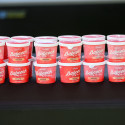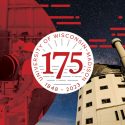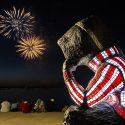More funding available as UW announces first 175th campus projects
The first set of campus projects selected to recognize and celebrate the University of Wisconsin’s 175th anniversary includes a speaker series, a glass exhibit and a collection of specimen models.
The 175th anniversary celebration focuses on the impact and reach of the Wisconsin Idea and the accomplishments of those 175 years.
The campus community can continue to submit proposals for funding to recognize and celebrate this anniversary.
Proposals can include events, initiatives, research projects, curriculum, academic efforts, artistic works or community outreach. Planners are expected to seek another round of proposals soon.
A Wisconsin botanical foray – 175 years of continuous plant collecting across the Badger State
Ken Cameron, the Wisconsin State Herbarium, $1,000
The Wisconsin State Herbarium at UW–Madison celebrated 175 years of plant collecting across the Badger State with an anniversary botanical foray held in Marinette County over the summer. Citizen scientists, students, faculty and staff from across the Universities of Wisconsin (formerly UW System) gathered together over a long weekend to document the flora of this under-explored area of Wisconsin. The group collected, pressed and dried more than 1,000 scientific plant specimens; each will be marked with a commemorative stamp before their accession into the permanent collection of the State Herbarium. Natural history collections like these have been a part of the UW’s educational, research and outreach efforts since its founding and remain at the center of its core mission in a rapidly changing world.
Present Tense: A decade of UW Glass
Helen Lee, UW Glass Lab (Art Department), $1,000
An alumni exhibition titled Glass Madison: The Sixth Decade of UW Glass will span multiple galleries on campus and present a survey of contemporary glass practice in a research-based, interdisciplinary arts environment. These exhibitions accompany an intercollegiate symposium and public programming (also under the name of Glass Madison). Collectively, these efforts diversify the narrative of glass at UW–Madison: They explore how glass serves research-based arts practices today, and they bridge these practices back to historical precedents of the pivotal role glass has played in establishing UW–Madison as a research institution on the global stage.
Re-creation of the glass invertebrate models for teaching at UW–Madison
Laura Monahan, Zoological Museum and Department of Chemistry, $1,000
UW–Madison’s Zoological Museum was established at the very first UW Board of Regents meeting in 1848. After the first Science Hall burned, Edward A. Birge — professor of zoology, later UW–Madison president — started purchasing specimens to replace ones lost in the fire, including a collection of glass invertebrate models created by German glassblowers Leopold and Rudolph Blaschka. The Blaschka models, purchased in 1890, were originally used for teaching, but are now considered works of art that cannot be exhibited and handled due to their delicate construction and weakened condition. 175th anniversary funding will support Tim Drier, a professional scientific and artistic glassblower with 40 years of experience, to work at UW–Madison for one week to apply his glassblowing expertise to this project. Tim and UW colleagues will create glass models of species not currently represented in the museum collections that are stable enough for teaching and display.
Wisconsin Innocence Project 25th anniversary speaker series
Rachel Burg, Wisconsin Innocence Project, $1,000
In the fall of 2023, the Wisconsin Innocence Project will present a three-part speaker series that celebrates its 25th anniversary alongside the 175th Anniversary of the University of Wisconsin. It will include conversations with lawyers and scholars working on issues related to wrongful convictions in Wisconsin and the nation. A highlight of the series will be a panel discussion with former and current Wisconsin Innocence Project attorneys and clients, reflecting how the Wisconsin Innocence Project has embraced the Wisconsin Idea for the last 25 years and taking an exciting look at the next 25.
Flyers for distribution to Washburn Observatory visitors; Historical and astronomical posters for Washburn Observatory
James Lattis, Department of Astronomy, $1,350
Washburn Observatory, an active and distinguished research facility for its first 80 years, has been open to the public on the first and third Wednesdays of each month, weather permitting, since April 1881. This is the longest continuous program of public access at an observatory in the United States and quite possibly in the world. As a long-standing program of public engagement, the Washburn Observatory visitor policy predates and embodies the spirit of the Wisconsin Idea.
This project will produce a set of educational posters for Washburn Observatory to share and raise awareness of the important history of astronomical accomplishments of UW astronomers and also to highlight some more recent research. The eight posters, which will be designed by Astronomy Department staff and students, will be permanently mounted at the observatory. Four will hang in the dome, where visitors await their turns at the eyepiece. These posters will have special illumination by clip-on, battery-powered red lights because the dome is typically kept dark during observing activities. The other four posters will be mounted inside the hallway display case in the observatory. The project will also print 1,000 trifold flyers designed by Astronomy Department staff and students.
In the Archives: A history of the English department’s involvement on campus and beyond
Caroline Hensley, English Department, $1,000
The English department archival project will investigate the program’s longstanding involvement on campus and in the broader Madison community. Led by English major interns, our team will conduct research in the UW Archives to trace historical narratives about student experiences, participation in local political organizing, curriculum debates, equity and inclusion in the department, faculty and staff projects and more. Additionally, we aim to establish an ongoing record of distinguished English alumni whose impact on campus or beyond is particularly notable. In an effort to embody the Wisconsin Idea, our undergraduate researchers will curate materials and share their analyses through public written engagements and an exhibition hosted by the English department.
Tags: UW175



